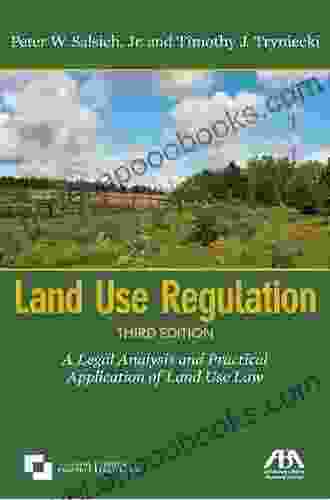Zoning Rules: The Economics of Land Use Regulation

Land use regulation is one of the most important tools that governments have to shape the development of their communities. Zoning, subdivision regulations, and impact fees are just a few of the tools that governments use to control the use of land.
4.5 out of 5
| Language | : | English |
| File size | : | 2634 KB |
| Text-to-Speech | : | Enabled |
| Enhanced typesetting | : | Enabled |
| Word Wise | : | Enabled |
| Print length | : | 467 pages |
| Lending | : | Enabled |
| Screen Reader | : | Supported |
This book provides a comprehensive overview of the economics of land use regulation. It examines the various tools that governments use to regulate land use, such as zoning, subdivision regulations, and impact fees. The book also discusses the economic effects of land use regulation, such as its impact on housing prices, land values, and economic development.
The Tools of Land Use Regulation
Zoning is the most common tool that governments use to regulate land use. Zoning ordinances divide a community into different zones, each of which has its own set of permitted uses. For example, a residential zone might only allow single-family homes, while a commercial zone might allow a variety of businesses.
Subdivision regulations are another important tool that governments use to regulate land use. Subdivision regulations control the way that land is divided into smaller lots. For example, a subdivision regulation might require that all new lots be at least a certain size or that they have a certain amount of frontage on a public street.
Impact fees are a type of fee that governments charge developers to offset the costs of new development. Impact fees can be used to fund a variety of public infrastructure projects, such as new roads, schools, and parks.
The Economic Effects of Land Use Regulation
Land use regulation can have a significant impact on the economy. Zoning, subdivision regulations, and impact fees can all affect the price of land, the cost of housing, and the pace of economic development.
For example, zoning can lead to higher housing prices by restricting the supply of land available for development. Subdivision regulations can also lead to higher housing prices by increasing the cost of land development. Impact fees can also lead to higher housing prices by increasing the cost of new construction.
Land use regulation can also affect the pace of economic development. For example, zoning can restrict the development of new businesses by limiting the amount of land available for commercial use. Subdivision regulations can also restrict the development of new businesses by increasing the cost of land development. Impact fees can also restrict the development of new businesses by increasing the cost of new construction.
The Benefits of Land Use Regulation
Despite the potential negative economic effects, land use regulation can also provide a number of benefits. Zoning, subdivision regulations, and impact fees can all be used to protect the environment, promote public health, and ensure the Free Downloadly development of communities.
For example, zoning can be used to protect environmentally sensitive areas, such as wetlands and forests. Subdivision regulations can be used to ensure that new developments have adequate access to public infrastructure, such as water and sewer service. Impact fees can be used to fund public infrastructure projects that are needed to support new development.
The Challenges of Land Use Regulation
Land use regulation is a complex and challenging issue. There is no one-size-fits-all approach to land use regulation that will work for every community. The best approach to land use regulation will vary depending on the unique circumstances of each community.
One of the biggest challenges of land use regulation is balancing the need for economic development with the need to protect the environment and public health. Another challenge is ensuring that land use regulations are fair and equitable to all members of the community.
Land use regulation is an essential tool for shaping the development of communities. Zoning, subdivision regulations, and impact fees are just a few of the tools that governments use to regulate land use. The economic effects of land use regulation can be significant, but land use regulation can also provide a number of benefits. The best approach to land use regulation will vary depending on the unique circumstances of each community.
This book provides a comprehensive overview of the economics of land use regulation. It is a valuable resource for anyone who is interested in learning more about this important topic.
Free Download your copy today!
4.5 out of 5
| Language | : | English |
| File size | : | 2634 KB |
| Text-to-Speech | : | Enabled |
| Enhanced typesetting | : | Enabled |
| Word Wise | : | Enabled |
| Print length | : | 467 pages |
| Lending | : | Enabled |
| Screen Reader | : | Supported |
Do you want to contribute by writing guest posts on this blog?
Please contact us and send us a resume of previous articles that you have written.
 Book
Book Novel
Novel Page
Page Chapter
Chapter Text
Text Story
Story Genre
Genre Reader
Reader Library
Library Paperback
Paperback E-book
E-book Magazine
Magazine Newspaper
Newspaper Paragraph
Paragraph Sentence
Sentence Bookmark
Bookmark Shelf
Shelf Glossary
Glossary Bibliography
Bibliography Foreword
Foreword Preface
Preface Synopsis
Synopsis Annotation
Annotation Footnote
Footnote Manuscript
Manuscript Scroll
Scroll Codex
Codex Tome
Tome Bestseller
Bestseller Classics
Classics Library card
Library card Narrative
Narrative Biography
Biography Autobiography
Autobiography Memoir
Memoir Reference
Reference Encyclopedia
Encyclopedia Mary Freeman
Mary Freeman Paolo Castelnuovo
Paolo Castelnuovo Nl Herzenberg
Nl Herzenberg United States Government Us Army
United States Government Us Army Susan Lundy
Susan Lundy Nicole Golding
Nicole Golding Sir Reed A Lott
Sir Reed A Lott Rohit Dharupta
Rohit Dharupta Rebecca Raisin
Rebecca Raisin Paul E Harvey Jr
Paul E Harvey Jr Phyllis Schlafly
Phyllis Schlafly Preston Manning
Preston Manning Rebecca Tinkle
Rebecca Tinkle Sanjiv Haribhakti
Sanjiv Haribhakti Stephen Paul West
Stephen Paul West The G
The G Rosario Andronaco
Rosario Andronaco Nick Sparks
Nick Sparks Yolanda Smith
Yolanda Smith Philip C Kolin
Philip C Kolin
Light bulbAdvertise smarter! Our strategic ad space ensures maximum exposure. Reserve your spot today!
 Milton BellFollow ·6k
Milton BellFollow ·6k Ryūnosuke AkutagawaFollow ·7.7k
Ryūnosuke AkutagawaFollow ·7.7k Jim CoxFollow ·10.7k
Jim CoxFollow ·10.7k Braeden HayesFollow ·14.3k
Braeden HayesFollow ·14.3k David Foster WallaceFollow ·5.8k
David Foster WallaceFollow ·5.8k Clarence BrooksFollow ·12.5k
Clarence BrooksFollow ·12.5k Gerald BellFollow ·15.2k
Gerald BellFollow ·15.2k Samuel WardFollow ·7.8k
Samuel WardFollow ·7.8k

 Shaun Nelson
Shaun NelsonUnlocking the Intricate Nexus: The Globalization and the...
In an era marked by...

 Robin Powell
Robin PowellLast Summer at the Golden Hotel: A Captivating Journey of...
Synopsis: A Transformative Summer at...

 Gabriel Mistral
Gabriel MistralContracts And Conmen In Europe Scramble For Africa
The late 19th and early...

 Glenn Hayes
Glenn HayesThe Story of the United States' Longest Wildcat Strike: A...
Prologue: The...

 Evan Hayes
Evan HayesBritain Empire Resistance Repression And Revolt:...
: The Tapestry of...

 Eddie Bell
Eddie BellGreen's Operative Hand Surgery: The Ultimate Guide for...
Green's Operative Hand Surgery is the...
4.5 out of 5
| Language | : | English |
| File size | : | 2634 KB |
| Text-to-Speech | : | Enabled |
| Enhanced typesetting | : | Enabled |
| Word Wise | : | Enabled |
| Print length | : | 467 pages |
| Lending | : | Enabled |
| Screen Reader | : | Supported |












